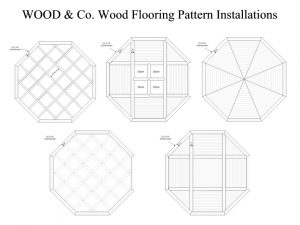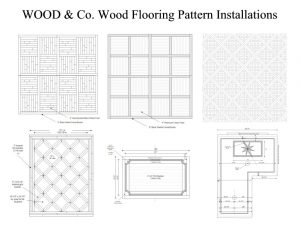 If you want to add class and style to your home, installing hardwood flooring can provide you with an instant upgrade. Decorative wood flooring is recognized as a premier flooring type. It not only adds a high-end feel to your home décor but can also serve as a resilient, long-lasting flooring option that can withstand years of use. The hardwood flooring market is now more dynamic than ever with a variety of wood options, engineered flooring products, and other innovative ways of incorporating the natural look and feel of wood into your home.
If you want to add class and style to your home, installing hardwood flooring can provide you with an instant upgrade. Decorative wood flooring is recognized as a premier flooring type. It not only adds a high-end feel to your home décor but can also serve as a resilient, long-lasting flooring option that can withstand years of use. The hardwood flooring market is now more dynamic than ever with a variety of wood options, engineered flooring products, and other innovative ways of incorporating the natural look and feel of wood into your home.
A decorative wood floor is within the reach of almost every homeowner due to affordable pricing and multiple style options. However, there are many myths about hardwood pricing, durability, production, and maintenance requirements that keep some homeowners from considering it as an option during renovations. However, many of these misconceptions are easily debunked with a dose of information. Keep reading to learn about a few of the common myths pertaining to hardwood flooring and how you can debunk them with facts.
Myth 1: Hardwood Floors Are Hard to Maintain
While the misconception may be that hardwood floors are difficult to maintain, nothing could be further from the truth. Hardwood floors are quite easy to keep in good shape, especially when compared to other flooring options, such as thick carpeting or rugs. Those who haven’t had hardwood floors may think that polishing, waxing, and refinishing are frequently required to keep them in top condition. However, regular sweeping and an occasional cleaning with a dry mop are all that is needed to keep hardwood floors looking great. True hardwood floors can be refinished after years of service, though engineered floors are made to last and can withstand a tremendous amount of use and heavy traffic.
Myth 2: Hardwood Is Too Expensive
While premium hardwood flooring may come at a premium price, the wood flooring market offers many options for those who want the beauty of hardwood flooring on a budget. There are many grades, species, and styles of wood flooring that can accommodate the most restrictive redecorating budget. While hardwood floors certainly provide the luxurious look of opulence to your home décor, their cost doesn’t have to be prohibitive for the discerning homeowner. Not only are flooring and installation costs comparable to other types of floors, but hardwood can last a lifetime. That means that you save money compared to carpet, for example, because you don’t have to replace your flooring as often.
Myth 3: Engineered Flooring Isn’t Real Wood
Engineered wood is a revolutionary style of flooring that is unlike laminate flooring, though the two are often confused. Laminate flooring features a veneer of hardwood over another substrate that isn’t necessarily made of hardwood. Engineered flooring is also made of thin veneers glued together like plywood, but it involves only hardwood layers assembled against one another with the grain of each piece running perpendicular to the one above and below it. Layers of hardwood are stacked to the desired thickness. Engineered flooring is thought to be more desirable than laminate flooring because it is made only of hardwood and has increased dimensional stability and resistance to temperature and moisture variance.
Myth 4: Hardwood Shouldn’t Be Used in the Kitchen
While there is a belief that hardwood flooring shouldn’t be used in rooms where there is the potential for water exposure, that misconception is erroneous. While the humid environment of a bathroom may not be ideal for most types of hardwood flooring, the kitchen is a different matter altogether. However, hardwood is ideally suited to the kitchen because of its resiliency, ease of maintenance, and sheer beauty. If you’re worried about the potential for spills, simply use rugs in areas where water exposure is more likely, such as the sink or in front of the stove. That way, there will be a buffer between spilled liquid and your hardwood flooring.
If you’re thinking about hardwood, make sure that you have the information to debunk some of the common misconceptions about decorative wood flooring. To learn more about hardwood flooring options and their benefits, visit WOOD & Co.

